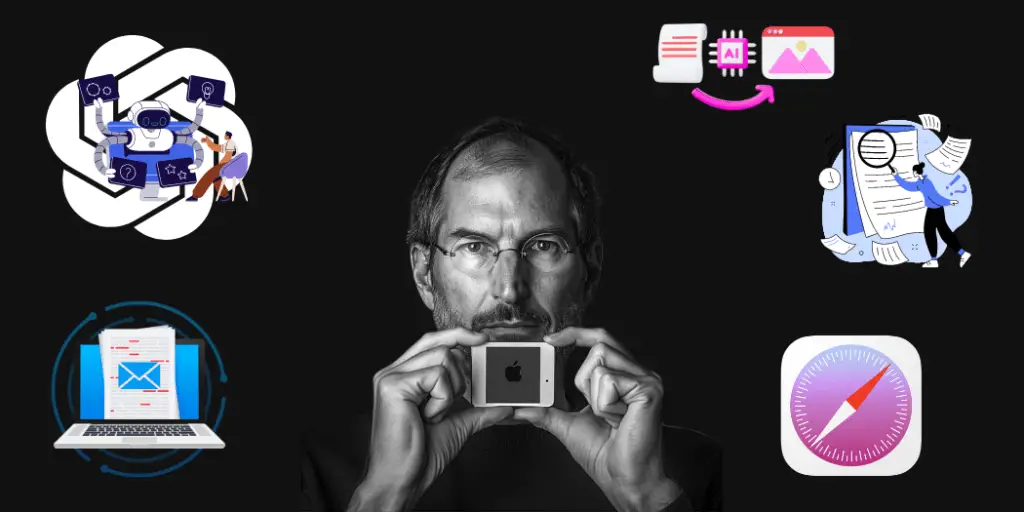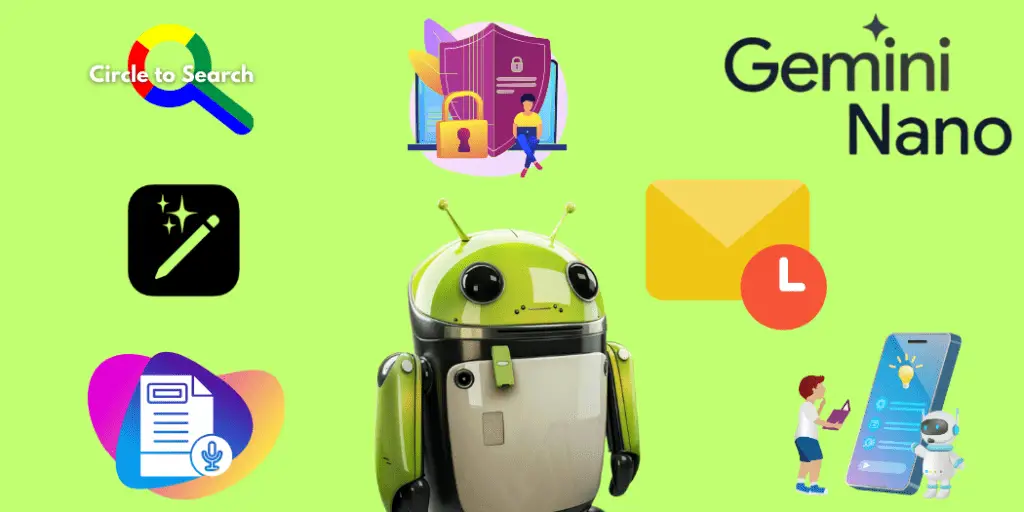Apple and Google reveal software updates that bring new features to our smartphones. These updates often include cosmetic changes to the home screen, enhanced privacy protections, and fun new messaging tools.
This year marks a radical shift as both companies focus on reinventing our phones with artificial intelligence.
At Apple’s annual software developer conference, the tech giant released a suite of enhancements coming this fall with iOS 18, the operating system that powers iPhones.
These updates include a revamped Siri, the company’s voice assistant, now equipped with advanced AI capabilities to generate images, summarize web articles, and craft responses to text messages and emails.
In its recent Android announcements, Google introduced an AI system capable of summarizing audio transcripts, detecting potential scam phone conversations, and assisting students with their homework.
As AI technology continues to evolve, its integration into everyday smartphone functions promises to transform how we interact with our devices.
The immediate change users will notice most profoundly is the improvement in text messaging between iPhone and Android users. This long-standing issue has made cross-platform communication cumbersome.
This fall, both Apple and Google will release their free software updates for iOS and Android, ushering in an era where artificial intelligence takes centre stage in enhancing smartphone capabilities.
Announcements from Apple
Siri’s Major Overhaul
Apple has undertaken a significant transformation of Siri, its 13-year-old virtual assistant. The updated version will be powered by Apple Intelligence, a sophisticated large language model. This new AI technology enables Siri to process the context of conversations.
It allows for more natural and fluid interactions with users. For example, you can now ask, “What’s the weather in Santa Cruz? Oh, wait, I meant San Francisco,” followed by “Schedule a coffee meeting there tomorrow at 9 a.m.”
Siri can handle more complex tasks, such as searching your photo album for an image of your driver’s license and extracting the ID number to paste into a form.
The new Siri can generate images, create summaries of web articles, and craft responses to text messages and emails.
Apple emphasizes that its AI system is more private than others, as users’ data will remain on their iPhones.

New AI Features in iOS 18
The upcoming iOS 18 has new AI-driven features designed to enhance user experience across various applications.
The AI can review your photo album for relevant images to generate personalized avatars or pictures. For instance, wishing a friend a happy birthday can trigger the AI to find a photo of that friend and create a custom birthday image with balloons.
- Users can highlight text in apps like Mail and Notes so the AI can proofread or rewrite it in a different style.
- Highlighting articles in Safari will enable the AI to generate concise summaries.
- Siri can leverage OpenAI’s ChatGPT for tasks such as generating recipe ideas.
Improved Text Messaging
Apple is addressing a long-standing issue with text messaging between iPhone and Android users by adopting Rich Communication Services in iOS 18. This update will allow for higher-quality images and videos in messages, bridging the gap between the green and blue bubbles.
Texts sent between iPhones and Androids will remain green but feature enhanced image and video quality.
A new feature in iMessage will allow users to schedule messages to be sent later, helping respect recipients’ boundaries by ensuring messages are sent during appropriate hours.
These updates, available on the newest iPhones this fall, signify Apple’s commitment to leveraging AI to create more intuitive, efficient, and user-friendly smartphone experiences.
Announcements from Google
Introduction of Gemini and Gemini Nano
Google has introduced Gemini, a new AI assistant designed to enhance the user experience on Android devices. This assistant functions similarly to chatbots like OpenAI’s ChatGPT, which can generate responses to various prompts.
Over the past year, users have been able to test Gemini by downloading an app, while the default virtual assistant on Android phones remains Google Assistant.
Acts as a versatile chatbot that can respond to various prompts, such as “Write a poem about dogs in San Francisco.”
A specialized version focusing on handling AI tasks directly on Pixel phones, ensuring better privacy by processing requests on the device rather than on Google’s servers.
New AI Features in Android
Google’s latest AI features, available primarily on Pixel phones with support for other Android devices expected later this year, are designed to improve various aspects of smartphone usage.
An AI-powered feature that listens to phone calls and identifies patterns indicative of scams, such as requests for online banking passwords, sending alerts to the user if a fraud is detected.
An expanded functionality that allows users to circle images for more information. This feature is now enhanced to help students with homework problems by generating a list of steps to solve a circled math or physics problem.
An AI tool that automatically generates written summaries from audio recordings, which is particularly useful for meeting notes and other recordings.
A feature within Google’s Messages app enables users to quickly rewrite messages in different styles, offering more flexibility and creativity in communication.

Improvements to Texting
Google also focuses on enhancing the texting experience, addressing a long-standing issue regarding message quality between iPhone and Android users.
Android has long supported RCS, and with Apple’s adoption of this standard in iOS 18, the quality of images and videos shared between iPhones and Androids will significantly improve.
Google’s Messages app will also feature the ability to schedule messages to be sent later, ensuring messages are sent at convenient and respectful times.
Privacy and On-Device Processing
Google’s focus on privacy includes the development of Gemini Nano, which processes AI tasks directly on the user’s device. This approach minimizes the need for data sent to Google’s servers, enhancing user privacy and security.
Legal Considerations
Apple’s Privacy Measures include on-device processing through Apple Intelligence, the AI system powering the new Siri, which ensures that users’ data remains on their iPhones, minimizing data transmission to external servers and enhancing user privacy and control over personal information.
Despite collaborating with OpenAI to integrate ChatGPT into Siri, Apple maintains strict privacy standards to protect user data from unauthorized access or misuse.
Google’s Privacy Enhancements feature Gemini Nano, which processes tasks directly on Pixel phones, reduces the need to send data to Google’s servers and safeguards user privacy by keeping more sensitive information within the user’s control.
The scam detection feature in Google’s AI operates in real-time on the device, providing immediate alerts without compromising user data by sending it off-device.
Integrating advanced AI features into smartphones raises legal considerations, particularly regarding data usage, copyright, and potential monopolistic practices.
The New York Times has filed a lawsuit against OpenAI and its partner Microsoft, alleging copyright infringement related to the use of news content in AI systems, highlighting the complexities and potential conflicts in using copyrighted material for training AI models.
Antitrust concerns are also present, with the Justice Department accusing Apple of maintaining a monopoly by placing restrictions on its phones, such as the messaging incompatibility between iPhones and Androids, which may have been used as a pressure tactic to persuade users to buy iPhones.
Rich Communication Services in iOS 18 is a step toward addressing these concerns by improving cross-platform communication quality.
Both companies are also focused on giving users more control over their data and greater transparency regarding how their information is used.
Apple and Google User Reception
Enhanced user experiences include more natural interactions with improved conversational abilities of Siri and Google’s Gemini, reducing the frustration often associated with virtual assistants.
Automated tasks, such as summarizing web articles, generating images, proofreading emails, and scheduling messages, offer increased convenience.
On-device processing enhances privacy and security by ensuring users’ data is not unnecessarily transmitted to external servers. In the long term, integrating AI into everyday smartphone functions signifies a broader shift toward more intelligent and autonomous devices.
This transformation implies changing user habits, growing dependence on AI for a broader range of activities and a learning curve for those less familiar with advanced technology. Market dynamics will also be affected.
Apple and Google’s focus on AI could set new industry standards, compelling other smartphone manufacturers to integrate similar technologies to remain competitive.
Enhanced AI features may further entrench users within the Apple or Google ecosystems, as these capabilities are often best utilized with other products and services from the same brand.
Despite these benefits, several challenges could affect user reception and the overall impact of these AI advancements. Privacy concerns persist, as users may still worry about data security and using and storing their information, even with on-device processing.

Transparency will be crucial, ensuring users fully understand and consent to AI features through transparency reports and user education.
Legal and ethical issues, such as the lawsuit from The New York Times against OpenAI, highlight concerns about using copyrighted material in AI training, and addressing antitrust concerns will be essential to prevent monopolistic practices and promote innovation.
User reception of these new AI features will vary among different groups. Tech enthusiasts are likely to embrace these advancements enthusiastically, appreciating the enhanced functionality and convenience and adopting new technologies quickly to provide valuable feedback for improvements.
General consumers may have mixed reactions, enjoying the convenience of AI-driven features but hesitating due to privacy concerns or the perceived complexity of new technology. This leads to gradual adoption as they become more familiar with and trust the latest AI capabilities.


